
Danger in truth: truth in danger
FEATURING
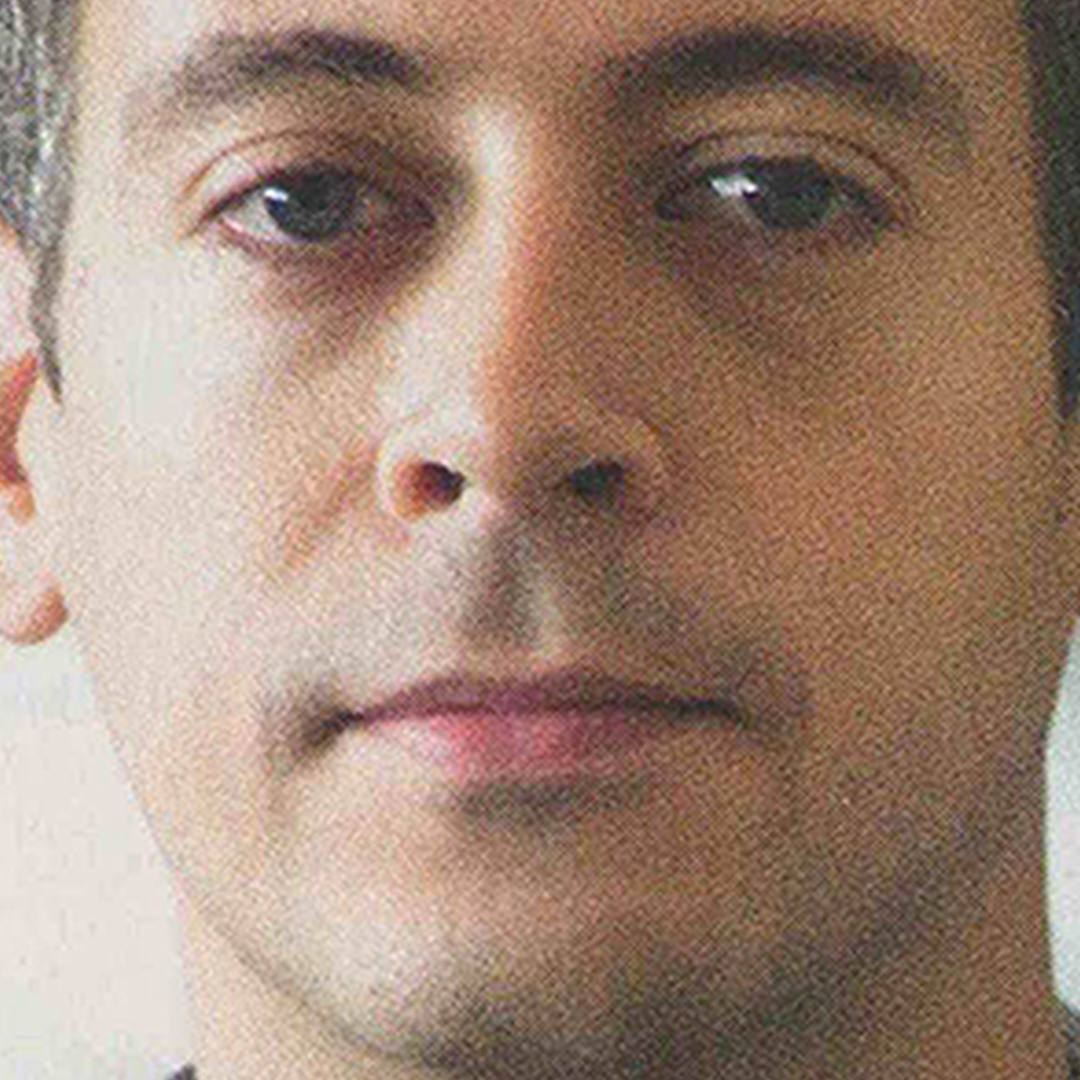
Kaya Genç
Novelist and essayist
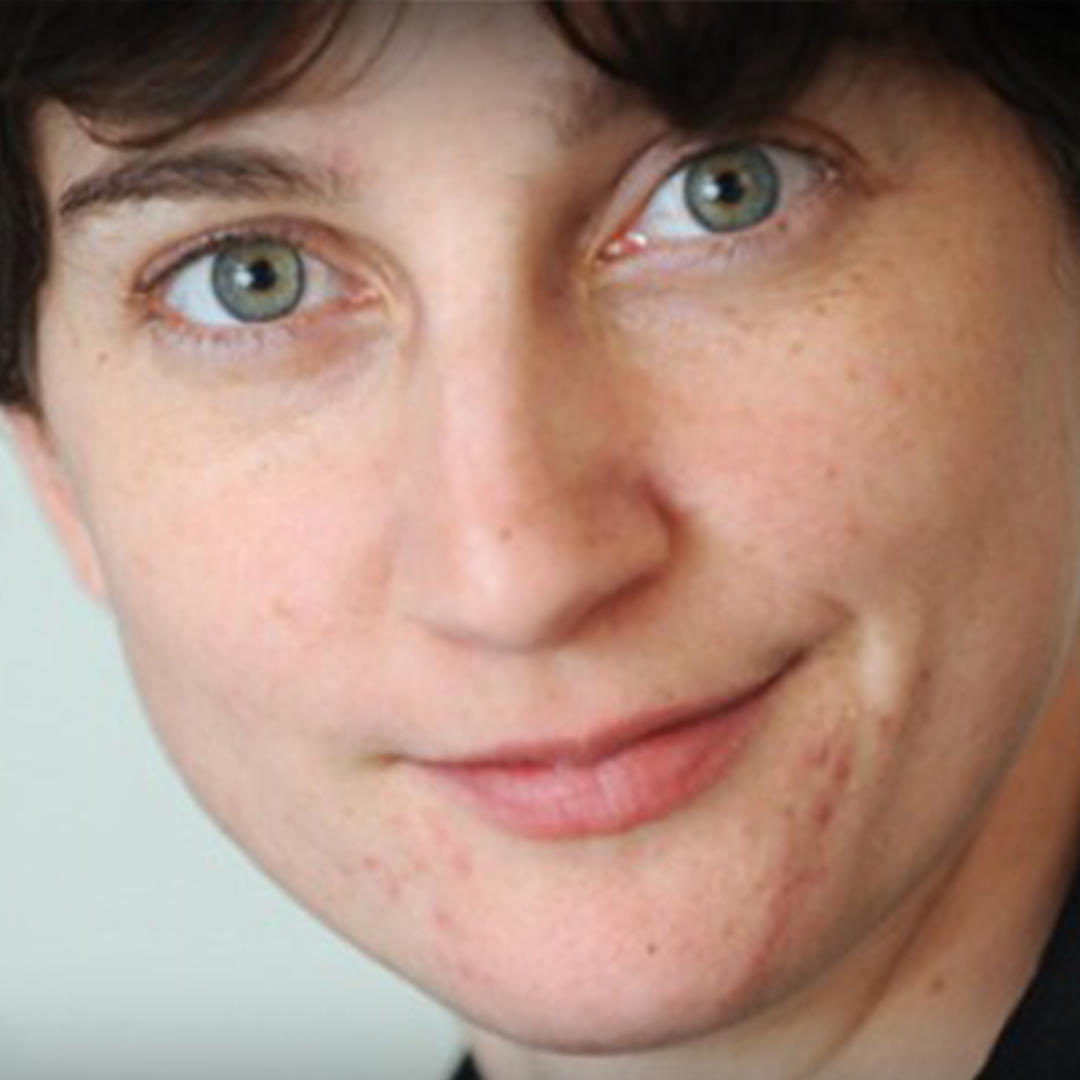
Natasha Joseph
Journalist and editor
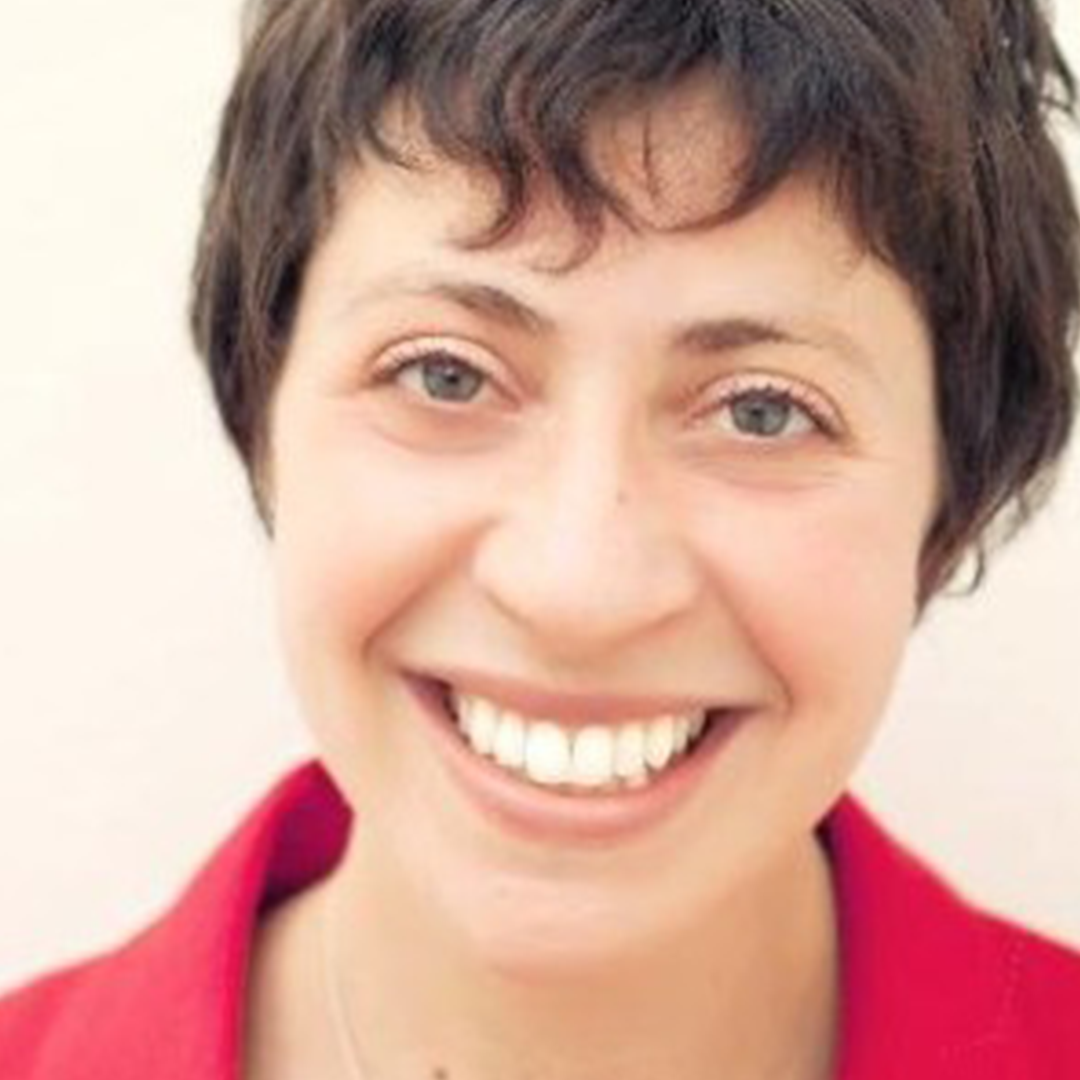
Irene Caselli
Journalist
FEATURING

Novelist and essayist

Journalist and editor

Journalist
April 2016 was the busiest month for Index on Censorship’s Mapping Media Freedom since the project began in May 2014, with a total of 87 violations against the media recorded. While MMF records violations from over 40 countries, the majority (55%) of last month’s violations came from just five countries.
These hotspots for attacks on the media will come as no surprise to anyone following the project in recent months.
#Turkey, 2 years sentence for publishing the @Charlie_Hebdo_ cover https://t.co/3oo7FM5hql @ceydak @hikmetcetinkaya pic.twitter.com/9sp49a2MpN
— Christophe Deloire (@chrisdeloire) May 1, 2016
With 16 violations recorded within its borders in April, Turkey is again the location with the most offences.
One of the most worrying occurrences last month was on 28 April when journalists Ceyda Karan and Hikment Chetinkaya, who work for Turkish daily Cumhuriyet, were sentenced to two years in prison for publishing the cover of Charlie Hebdo magazine featuring an image of prophet Muhammad. The pair were convicted of inciting “hatred and enmity”.
In another instance, on 30 April, Hamza Aktan, news director of private Istanbul-based IMC TV, was arrested by anti-terror police. Aktan was escorted to the police station where he was interrogated for 12 hours and then released. The editor is being accused of spreading propaganda for a terrorist organisation and trying to build public opinion abroad against interests of Turkey for four public tweets.
As the Panama Papers showed in April, investigative journalism is essential if misconduct and abuse by big business are to come to light. This makes a recent trend in Russia all the more worrying.
A total of 12 reports were filed in Russia last month, three of which related to journalists investigating business. On 12 April, when covering truckers protesting against the “illegal” actions of Omega, journalist Anton Siliverstov’s phone was stolen by Evgeni Rutkovski the director of the transport company. When he asked Rutkovski to comment on the protest, Siliverstov was forced from the office. The journalist said he would record the incident on his phone, at which point Rutkovski snatched the journalist’s device, refused to give it back and called security. Siliverstov hasn’t seen the phone since.
Two days later, reporter Igor Dovidovich was assaulted by the head of Gaz-Service, a gas company he was investigating. His TV crew was also attacked by the firm’s employees.
The month ened with state oil company Rosneft filing a judicial complaint against BiznessPress for an article which, the firm said, is “false and represents baseless fantasies of journalists or their so-called sources”.
Ukraine continues to be unsafe for many media workers, with nine reports submitted to the project in April. Violations included five cases of intimidation, two attacks to property and several physical assaults. On 1 April, unidentified assailants set a local TV studio on fire with molotov cocktails. Studio equipment and furniture were destroyed. No one was injured.
Three days later, claims emerged that journalists working for TV channel 1+1 were under surveillance, have received death threats and have been assaulted. Later in the month, journalists from the station were attacked on 19 and 20 April.
Belarus/Беларусь: Freelance journalist fined sixth time this year https://t.co/jrRpX8Msz0#mediafreedom #mapmf
— Index on Censorship (@IndexCensorship) April 14, 2016
Journalism is not a crime, but you’d be excused for thinking otherwise when observing recent events in Belarus. Seven reports were filed for Belarus last month, including two criminal charges resulting in fines, three arrests, and one journalist interrogated for doing his job.
On 15 April, freelance journalists were fined approximately €330 each for contributing to Polish TV channel. Kastus Zhukousky and Larysa Schyrakova were found guilty of illegal production and distribution of media products and for contributing to a foreign media outlet without accreditation.
Zhukouski has been fined seven times this year alone.
Six reports were submitted from Macedonia during April. The most worrying instances involved attacks to property (2) and a physical assault, leading to an injury.
April saw a wave of anti-government protests with thousands marching, mainly peacefully, through the capital city of Skopje. On 13 April four photographers and one journalist were injured by police during the anti-government demonstration. Two TV journalists were also injured by demonstrators on the day. On 14 April the offices of the Slobodna Makedonija radio station were pelted with stones by some anti-government demonstrators, causing the windows to break and other material damages.
Mapping Media Freedom Quarterly Report
Index on Censorship has released its report for the first quarter of 2016 covering 1 January and 31 March 2016. During this time: Four journalists were killed; 43 incidents of physical assault were confirmed; and there were 87 verified reports of intimidation, which includes psychological abuse, sexual harassment, trolling/cyberbullying and defamation. Media professionals were detained in 27 incidents; 37 criminal charges and civil lawsuits were filed; and media professionals were blocked from covering a story in 62 verified incidents.
“Conflict in Turkey and eastern Ukraine along with the misuse of a broad range of legislation — from limiting public broadcasters to prosecuting journalists as terrorists — have had a negative effect on press freedom across the continent,” Hannah Machlin, Mapping Media Freedom project officer, said.
Mapping Media Freedom
|
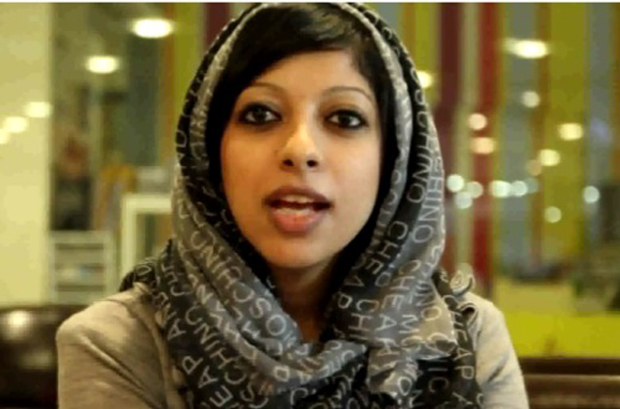
On 7 April 2016, Bahraini foreign minister Sheikh Khaled bin Ahmed al-Khalifa told the US State Department during meetings with Secretary of State John Kerry that activist Zainab Al-Khawaja, who was imprisoned on 14 March along with her one-year-old son Abdulhadi, would be freed.
One month on, we are still waiting for her release.
Index on Censorship has repeatedly expressed concerns over the detention and treatment of Al-Khawaja. After being taken into custody, she was transferred to the Isa Town Detention Center, which has been criticised for its poor sanitation and regular outbreaks of Hepatitis C, to serve out her prison term. She was initially denied food for herself and her son.
In October 2015, Bahrain’s appeals court confirmed her conviction for insulting the king of Bahrain by tearing up a photograph of him and reduced her three-year prison sentence to one year.
“Zainab Al-Khawaja is serving prison term based on charges related to her right to freedom of expression and assembly,” said Index’s senior advocacy officer Melody Patry. “Her imprisonment violates international human rights standards and every day she spends in jail brings into question Bahrain’s commitment to democracy and the rule of law.”
“We call on Bahrain to keep the promise made to the US State Department a month ago to release Zainab Al-Khawaja with no further delay,” Patry added.
The US State Department has also reminded Bahrain to follow its promise to release Al-Khawaja and her son “as soon as possible”. The UK government has raised Al-Khawaja’s case “with the Government of Bahrain at the highest levels”, but has failed to call for her release.
The Al-Khawaja family, who have been active in Bahrain’s pro-democracy movement, and have been harassed and targeted by authorities.
Al-Khawaja’s father, Abdulhadi Al-Khawaja, head of the 2012 Index Award-winning Bahrain Center for Human Rights, is serving a life sentence for the role he played in the 2011 demonstrations in Bahrain.
Bahrain must now adhere to its promise and free Zainab Al-Khawaja.
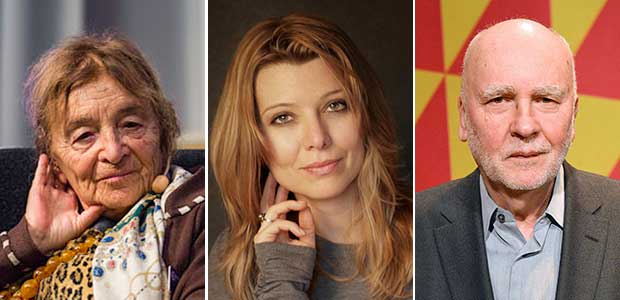
Join Agnes Heller, Elif Shafak and Adam Zagajewski for a discussion about Europe’s changing environment for freedom. (Photos: Agnes Heller, Elif Shafak: Wikipedia; Adam Zagajewski: Frankie Fouganthin via Wikipedia
“The point of the future is that anything can happen.” – Victor Orban, prime minister of Hungary
Europe was a bastion of hope for more than a million refugees last year. What brought them? A hunger for safety and security? Dreams of freedom? The draw of liberal democracy with its ideals of free expression, equal opportunity and persecution for none?
But look within our own continent and you will see the cracks. In Hungary, Victor Orban’s administration looks increasingly autocratic. Poland’s new conservative government is making changes to its public media that critics have said amount to a takeover. How can we support neighbours like Turkey in their fight to avoid authoritarianism if we can’t fly the banner for freedom at home?
On the eve of the EU referendum, three major cultural figures from Hungary, Poland and Turkey gather in London to compare their stories and ask: is Europe just a place, or a set of values that are rapidly unravelling?
Featuring:
When: Wednesday 15 June, 6.45pm
Where: Free Word Centre, 60 Farringdon Rd, London EC1R 3GA (Map)
Tickets: £5/£3 from Free Word website or 0207 324 8904
This event will be live streamed. Click here to tune in to the Free Word YouTube livestream, which will begin at 6.45pm (BST) on Wednesday 15 June 2016. Join in the conversation by tweeting @IndexCensorship using the hashtag #FWEurope.
Presented in partnership with:
More about the panelists:
Agnes Heller was born in 1929 and is one of the leading thinkers to come out of the tradition of critical theory. Her broad intellectual range and publications include ethics, philosophical anthropology, political philosophy and a theory of modernity and its culture. Hungarian by birth, she was one of the best-known dissident Marxists in central Europe in the 1960s and 1970s. She has held visiting lectureships all over the world and has been the Hannah Arendt Professor of Philosophy at the New School in New York. She now lives in Budapest and is one of the most popular and outspoken critics of the current regime.
Elif Shafak was born in Strasbourg, France, in 1971. She is an award-winning novelist and the most widely read woman writer in Turkey. Critics have named her as “one of the most distinctive voices in contemporary Turkish and world literature”. Her books have been published in more than 40 countries and she was awarded the honorary distinction of Chevalier of the Order of Arts and Letters. Elif has published thirteen books, nine of which are novels. She writes fiction in both Turkish and English. Elif blends Western and Eastern traditions of storytelling, bringing out the myriad stories of women, minorities, immigrants, subcultures, youth and global souls. Her work draws on diverse cultures and literary traditions, as well as a deep interest in history, philosophy, Sufism, oral culture, and cultural politics. Elif’s writing breaks down categories, clichés, and cultural ghettoes. She also has a keen eye for black humour.
Adam Zagajewski is an award-winning poet, novelist, translator and essayist. Born in Lwow in 1945, he first became well-known as one of the leading poets of the Generation of ‘68’ or the Polish New Wave (Nowa Fala). His poems and essays have been translated into many languages. Among his honors and awards are a fellowship from the Berliner Kunstlerprogramm, the Kurt Tucholsky Prize, a Prix de la Liberté, and a Guggenheim Fellowship. Since 1988, he has served as visiting associate professor of English in the Creative Writing Programme at the University of Houston. In 2010, he was nominated for the Nobel Prize in Literature. Adam is currently co-editor of Zeszyty Literackie (Literary Review). He lives in Krakow.
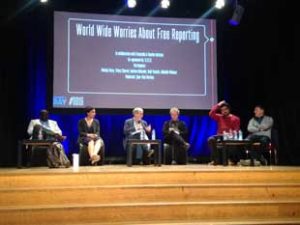
L-R Antoine Kaburahe, Melody Patry, Jean-Paul Marthoz, Thierry Chervel, Abdualla Maksour and Rudi Vranckx discuss world wide worries about free reporting
This week’s Difference Day conference in Brussels was all about celebrating press freedom. “Should we instead mourn press freedom?” asked Jean-Paul Marthoz, EU correspondent for the Committee to Protect Journalists.
Journalists and media professionals from across the world attended the World Press Freedom Day event at the Bozar Centre for Fine Arts on 3 May.
Marthoz was joined at the World Wide Worries About Free Press debate by Index on Censorship’s senior advocacy officer Melody Patry, journalist Thierry Chervel, founder and director of Burundi-based newspaper IWACU Antoine Kaburahe, conflict journalist Rudi Vranckx, and Syrian journalist and novelist Abdualla Maksour.
Patry drew attention to the work of those who fight to protect press freedom. She said although she can understand the position of “pessimists among us today”, having “a day to celebrate journalism and the free press already shows that we are attached to the idea that we need to support and protect the standards of journalism across the world, and highlight the work of journalists who are imprisoned and even killed for reporting the news”.
Conflict journalist Rudi Vranckx was less optimistic. He told of how every translator he worked with in Iraq, Syria, Gaza and Egypt has since been forced to flee their home.
Vranckx’s concerns were shared by Maksour who, holding a sign with the Aleppo is burning hashtag, highlighted the situation in Syria, stating that 15 civilians had died there on that morning alone.
“You can’t find a foreign journalist out there because it is very dangerous – they will be arrested or be killed,” said Maksour, adding that the situation prevents us from seeing the real picture of what is going on in Syria.
In an earlier debate, EU Media, Censorship and Propaganda, Patry introduced Index on Censorship’s Mapping Media Freedom project and took part in a discussion with Marthoz, Jakub Kalensky of the East StratCom Task Force and Maria Donde, Ofcom’s international policy manager.
The debate focused on ways to counter propaganda with information that is readily and safely available for anyone, so that people can make up their own mind.
“People, of course, should have access to as wide a range of information as possible, but what’s continually important is for them to have critical understanding to be able to tell the difference between a fabricated, exaggerated, poorly sourced story and what is a credible news source,” Donde said.
Patry, agreeing with Donde, suggested people shouldn’t necessarily believe everything they see on the TV. “Journalists doing a good job, verifying sources, and verifying information is also part of improving the wider environment for press freedom and pluralism in Europe,” she added.
Difference Day showed that press freedom never comes without challenges. It may be time to ask ourselves seriously: is it time to mourn or celebrate?
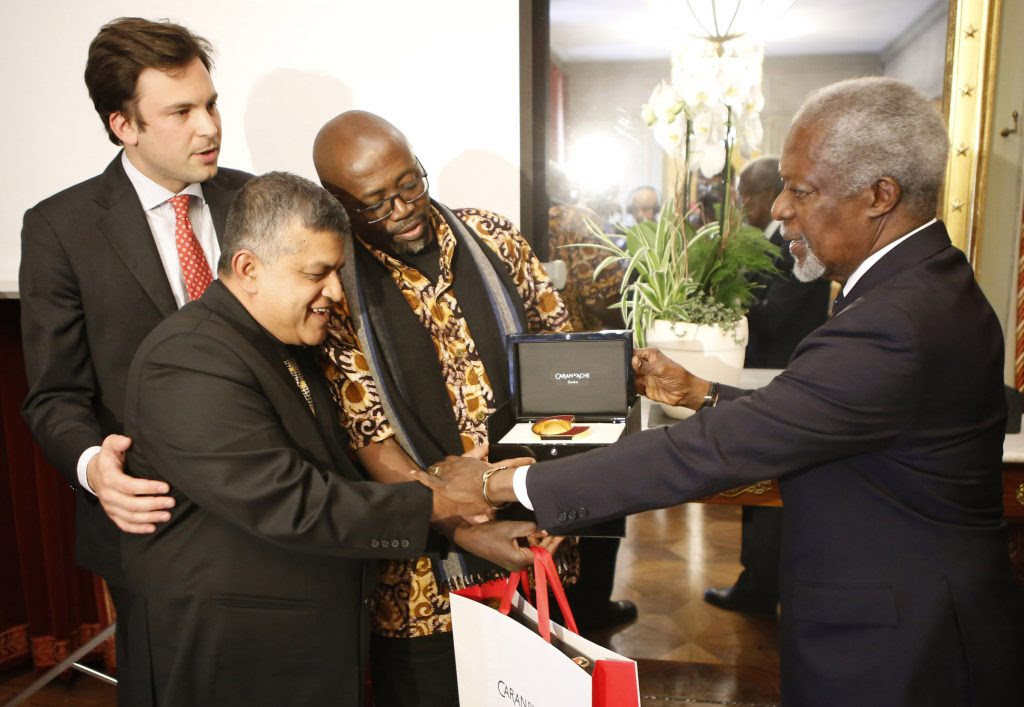
Zunar receiving the award from Kofi Annan, secretary-general of the United Nations, at the Palais Eynard, Geneva
Malaysian cartoonist Zulkiflee Anwar Haque, aka Zunar, has won the 2016 Cartooning for Peace Prize.
The award was presented at a ceremony at the Palais Eynard in Geneva on Monday 3 May 2016 by the honorary president of the Swiss Foundation Cartooning for Peace and former secretary-general of the United Nations Kofi Annan.
Annan said the award — jointly won by Kenyan cartoonist Gado — “reminds us how fragile this liberty remains in Africa and in Asia as well as in other regions of the world”.
“Through their commitment towards open and transparent societies, Gado and Zunar, who have received threats in their countries of origin and can no longer practice their profession, confront us with our responsibility to preserve freedom of expression and act in order to support the combat of those who cannot express themselves through their art,” Annan added.
Zunar has been repeatedly targeted with arrest, detention and harassment for his cartoons which are critical of corruption and abuses of power committed by the Malaysian government. He is currently facing nine charges of sedition for criticising Malaysia’s judiciary over the recent incarceration of a Malaysian opposition leader and faces a possible 43 years in prison if found guilty.
The cartoonist said the Cartooning for Peace Prize gives him “strength for me to continue the fight against the 60-year old corrupt and repressive Malaysian regime”.
He said human rights and freedom of expression are in “dire straits” in Malaysia and the country’s institutions and draconian laws such as the Sedition Act are routinely used as a tool to “silence critics” and “maintain power”.
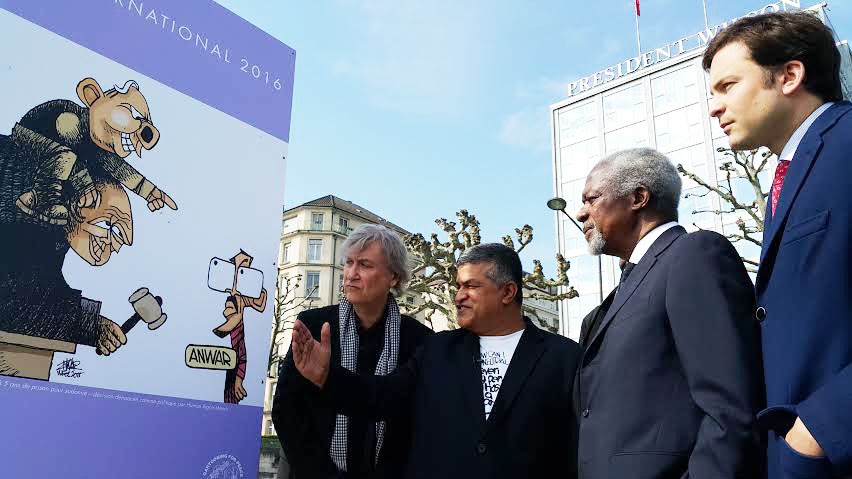
“Talent is not a gift, but a responsibility,” Zunar added. “It is a duty for me as a cartoonist to use the art as a weapon to fight unjust rulers. Fear and intimidation are the potent tools being used by the regime to scare the people.”
“I also strongly believe that, when faced with a moral crisis, there is no room to grumble in silence. We have to stand up and cry our voice out loud and clear. Neutrality is escapism for those who live in a comfort zone.”
Zunar has spent two periods in Malaysian jails, firstly in September 2010 and again from 10 February 2015. Several of his books have been banned while bookstores carrying his works have been raided and three of his assistants were arrested in October 2014 for selling his books. The webmaster, who manages his website and online bookstore, has been interrogated by Malaysian police.
Zunar has previously been awarded the 2011 Courage in Editorial Cartooning Award by Cartoonists Right Network International, the 2011 and 2015 Human Rights Watch Hellman/Hammett Award, and the 2015 International Press Freedom Award by the Committee to Protect Journalist.
Zunar received a standing ovation at Index on Censorship’s Freedom of Expression Awards in London in April.
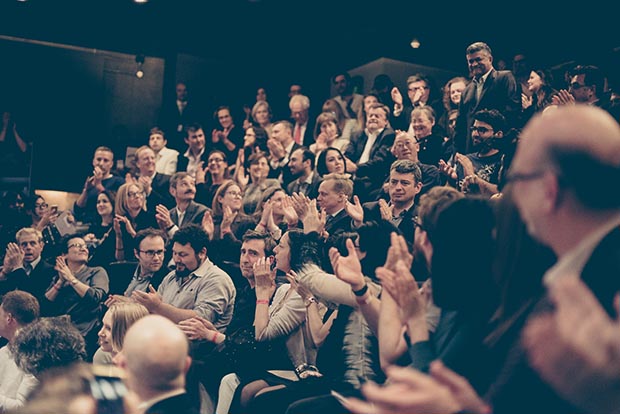
Zulkiflee Anwar Haque, aka “Zunar”, upper right, is saluted by the audience. (Photo: Elina Kansikas for Index on Censorship)

February 4, 2013. Recep Tayyip Erdogan during a press conference in Prague.
With conditions worsening on a daily basis, Turkey now risks total blackout on public debate.
Punitive measures and harsh restrictions have diminished the domain for free and independent journalism, and media pluralism is showing strong signs of total collapse.
As Index on Censorship’s Mapping Media Freedom project highlights in its latest quarterly report, the country experienced a large number of media freedom violations.
“Over half of the arrests [in the first quarter of 2016] occurred in Turkey when journalists were reporting on violence or protests in the country,” the report said. “The data indicates a pattern where arrests are launched on terror charges or taking place during anti-terror operations.”
In its latest World Press Freedom Index, scrutinising media in 180 countries, Reporters Without Borders (RSF) ranked Turkey as #151, marking yet another fall, this time by two positions.
“President Recep Tayyip Erdogan has embarked on an offensive against Turkey’s media. Journalists are harassed, many have been accused of ‘insulting the president’ and the internet is systematically censored,” RSF said in its findings.
The decline was even more dramatic in the annual Freedom of the Press 2016 survey by Freedom House. Its survey over the past year marked a fall by six points, placing Turkey as 156th among 199 countries, again among those as “not free”.
“The government, controlled by Erdoğan’s Justice and Development Party (AKP), aggressively used the penal code, criminal defamation legislation, and the country’s antiterrorism law to punish critical reporting, and journalists faced growing violence, harassment, and intimidation from both state and non-state actors during the year. The authorities continued to use financial and administrative leverage over media owners to influence coverage and silence dissent,” it concluded.
This downfall is unprecedented in intensity. The country’s remnant core of brave, free and independent journalists, regardless of their political views, now agree that free journalism will soon cease to exist in Turkey. With full-frontal attacks on the media, the sector may become subservient to the political and bureaucratic power, with content rife with stenography and propaganda.
Legal inquiries and charges against journalists are continually on the rise. According to the ministry of justice, the number of “insulting the president” cases passed 1,800 since mid-2014.
In other cases, such as the charges brought against Cumhuriyet daily, its editors Can Dündar and Erdem Gül are accused of spying and treason, for printing news stories about lorries carrying weapons, allegedly to Syrian jihadist groups, by the government’s orders.
In another notorious case, investigative journalist Mehmet Baransu has been detained for over 13 months over his inquiries into the alleged abuses of power within the military.
In a fresh case, two senior journalists from Cumhuriyet, Ceyda Karan and Hikmet Çetinkaya, were sentenced to two years each in prison for “inciting hatred”. Their “crime” was to reprint the Charlie Hebdo front page cartoon in their column, which they said was an act of professional solidarity.
According to Bianet, a monitoring site, there are now 28 journalists in Turkish prisons, many of whom are affiliated with the Kurdish media, based on charges brought under anti-terror laws.
The draconian nature of charges and prison sentences leave little doubt about AKP government’s intent to criminalise journalism as a whole.
Punitive measures against journalism go far beyond court cases. The most efficient method has proven to be firing journalists who insist on exercising basic standards of the profession.
Since mid-2013, following Gezi Park protests, 3,500 journalists have lost their jobs. Media moguls have come under increasing pressure from the government, which demands action or threatens to cancel lucrative public contracts. Taking advantage of the low influence of trade unions (fewer than 4% of journalists are members), employers axe staff arbitrarily.
As a result of this widespread exercise in conglomerate-dominated “mainstream media”, with newsrooms turned into “open-air prisons”, self-censorship in Turkey has become a deeply rooted culture. Blacklists have been drawn up of TV pundits and columnists in the press, who are known for critical stands, no matter their political leaning.
What apparently weighed heavy in the gloomy figures by Index on Censorship, RSF and FH is the fact that, from early last year, authorities started also targeting large, private media institutions, known for critical journalism.
Hürriyet, an influential newspaper belonging to Doğan Media was attacked by a mob two nights in a row last summer, after which its owners felt they had to “tone down” critical content.
In even more dramatic cases, Koza-Ipek Media outlets were raided by the police last autumn, followed some months later by a similar large-scale operation against Zaman Media, second largest group in the sector, and the largest independent news agency, CHA.
These seizures, along with some other critical channels yanked off satellite and digital platforms in recent months, left a huge vacuum, threatening to terminate the diversity of the media.
Now, with around 90% of the sector under direct or indirect editorial control of the AKP government, including the state broadcaster TRT, there are only three critical TV channels and no more than five small-scale independent newspapers left.
As a result of these assaults, two things are apparent: firstly, investigative journalism is blocked and news is severely filtered; secondly, with diversity fading out, public debate, a key aspect of any democracy, is severely limited.
Along with routine bans on reporting on specific events such as terror attacks, severe accreditation restrictions and a newly emerging pattern of deporting international media correspondents, the conclusion is inevitable.
A profession faces extinction and along with its exit, and a thick wall between the truth and the public, both domestic and international, is emerging. This total collapse will have far deeper consequences than anyone can imagine.

What’s great about the UK theatre industry today? How will the art and practice of theatre need to adapt to thrive in the next ten years? How can theatre play a more prominent role in key issues of national and international debate? And will theatre inevitably become a minority interest for an increasingly diverse population?
Join us at Theatre 2016 to celebrate the UK’s status as a world leader in theatre and debate these and other important issues with colleagues from across the sector.
Index on Censorship’s associate arts producer Julia Farrington will be taking part in a panel:
Meeting Ethical and Reputational Challenges – Panel Discussion in partnership with What Next? Ethics initiative, followed by debate and resolutions
In this special panel session programmed in partnership with the What Next? Ethics initiative, Julia Farrington will discuss the pressure to censor/self-censor; how this has changed, what challenges organisations need to be aware of in the future and how organisations can work with other sectors (including the police) within this context. Louise Jeffreys shares experiences of taking risks and breaking boundaries and what happens when increased external pressure can lead to censorship and how organisations can best respond and the support individuals can offer each other in these situations. Clare Slater will share the background to the Meeting Ethical And Reputational Challenges guidance and share how it can be used by organisations to develop ethical policies to ensure they are better prepared for future challenges.
When: Thursday 12 May, Friday 13 May
Where: Piccadilly Theatre, 16 Denman St, London W1D 7DY (Map)
Tickets: From Theatre 2016 site
On World Press Freedom Day, 3 May 2016, Azerbaijan’s independent media is under greater attack than ever before.
The undersigned members of the Sport for Rights coalition condemn the Azerbaijani authorities’ relentless crackdown on the independent media and other critical voices. Sport for Rights calls on the Azerbaijani authorities to implement immediate and concrete steps to improve freedom of expression in the country, starting with the unconditional release of UNESCO/Guillermo Cano World Press Freedom Prize winner Khadija Ismayilova and Azerbaijan’s other jailed journalists, bloggers, and other political prisoners.
Despite the recent releases of 16 political prisoners, dozens remain jailed for political reasons in Azerbaijan. Among them are journalists Nijat Aliyev, Araz Guliyev, Seymur Hezi, and Khadija Ismayilova; bloggers Abdul Abilov, Faraj Karimov, Rashad Ramazanov, and Ilkin Rustemzade; and others targeted in connection with exercising their right to freedom of expression, such as opposition Republican Alternative (REAL) movement leader Ilgar Mammadov.
The authorities’ pressure on journalist Khadija Ismayilova has been particularly relentless. She has been extensively targeted for exposing corruption of President Aliyev’s family and other ruling elite, topics recently brought into the spotlight again by the Panama Papers leaks. Ismayilova is currently serving a 7.5-year prison sentence on spurious charges of illegal entrepreneurship, tax evasion, and abuse of power.
“The continued imprisonment of Khadija Ismayilova and other journalists is unacceptable and undermines any goodwill generated by the recent releases of political prisoners in Azerbaijan. UNESCO’s decision to award Ismayilova the World Press Freedom Prize should serve to inspire renewed international calls for her release. The Azerbaijani government must free Ismayilova and cease its attack on critical voices”, said Jesper Højberg, Executive Director of International Media Support.
At the same time, the Azerbaijani authorities have shown that their revolving-door policy of politically motivated arrests is still in place. On 30 March, 79-year old writer Akram Aylisli was detained at the Baku airport on the way to a literary festival in Italy. He was questioned for 12 hours and told he was under a travel ban. Aylisli now faces up to three years in jail on spurious charges of violently resisting authorities.
The Azerbaijan Prosecutor General’s Office has also opened a criminal case against Meydan TV, an independent online media outlet based in Berlin that provides alternative news coverage of Azerbaijan. Meydan TV is being investigated for alleged illegal entrepreneurship, tax evasion, and abuse of power. Fifteen journalists have been specifically named in the investigation, many of whom remain in the country, now under travel bans, and face the very real threat of imprisonment. Meydan TV’s staff based abroad have also been targeted through threats and extensive pressure on their relatives, including job dismissal and politically motivated detention.
“A diverse and pluralistic media is a hallmark of a democratic and progressive state. The renewed crackdown on Meydan TV, alongside repression of other critical media outlets, demonstrates the Azerbaijani government’s unwillingness to tolerate any criticism and a total failure to commit to systemic and genuine reforms that would enable freedom of expression for all”, said Thomas Hughes, Executive Director of ARTICLE 19.
All of this occurs against the backdrop of a broader crackdown on freedom of expression and other human rights in Azerbaijan. Other independent media and NGOs working to promote free expression have been targeted in recent years, including Radio Free Europe/Radio Liberty’s Baku bureau and the Institute for Reporters’ Freedom and Safety. The state completely dominates the broadcast media, and one of the few remaining critical newspapers, Azadliq, has been forced to suspend publication of its print edition and teeters on the brink of closure. Violent attacks against journalists – including murders – are committed with impunity, resulting in a climate of fear for the independent media.
The Sport for Rights coalition calls for the Azerbaijani authorities to take immediate and concrete steps to cease this persecution of the independent media, starting with the unconditional release of Khadija Ismayilova and Azerbaijan’s other political prisoners. Sport for Rights also calls for sustained international attention to the broader human rights crackdown in the country, especially in the run-up to the Formula One European Grand Prix, which will take place in Baku from 17 to 19 June. The Azerbaijani government must be held accountable for its international human rights obligations.
Supporting organisations:
ARTICLE 19
Canadian Journalists for Free Expression
Civil Rights Defenders
Committee to Protect Journalists
Freedom Now
Human Rights House Foundation
Index on Censorship
Institute for Reporters’ Freedom and Safety
International Media Support
International Partnership for Human Rights
NESEHNUTI
Netherlands Helsinki Committee
Norwegian Helsinki Committee
PEN America
PEN International
People in Need
Reporters Without Borders
YouAid Foundation
Mr Isaias Afewerki
President of Eritrea
Office of the President
PO Box 257
Asmara, Eritrea
Dear President Afewerki,
We, the Youth Advisory Board of Index on Censorship — a global free expression organisation — are writing to you to call for the immediate release of imprisoned journalists in Eritrea.
We condemn the brutality and ruthlessness with which your regime has gagged expression and assaulted the rights of its citizens to access information.
The very constitution on which your regime governs upholds the rights of all to freedom of conscience. Yet journalists are imprisoned and go missing at the hands of your government. Eritrea has been ranked last on the Reporters Without Borders World Press Freedom Index for the past eight years. At least 15 journalists are currently detained and, out of 13 journalists incarcerated in 2001, only four remain alive today.
Dawit Isaak, a Swedish-Eritrean journalist, was arrested in 2001 and has since been held incommunicado and in solitary confinement without any charges or a verdict. He has not seen a lawyer or his family for 13 years. Eritrean authorities have ignored the appeals of the European Union, the African Commission on Human and Peoples’ Rights and a lawsuit before a Swedish court.
Seyoum Tsehaye, imprisoned for writing an article that criticised your regime, also has not seen anyone from the outside world since 2001 — including his daughter, who was born soon after his arrest.
Seyoum is a journalist, photographer and prisoner of conscience who earned fame for capturing moving images of Eritrea’s war of independence. That war ended in Eritrea’s first multi-party elections in which your party was victorious, but the people of Eritrea have not seen elections or democracy in any meaningful form since. For speaking out and fighting for freedom to be restored to his country, Seyoum has paid a heavy price.
Eritreans have been denied their human right to freedom of expression. International agencies and human rights groups have alerted the world to arbitrary imprisonment and torture within Eritrea. The government’s attempts to silence critical voices and media workers must end. We urge you to release all journalists from prison and respect international human rights law by granting all Eritreans their right to freedom of expression.
Signed,
The Index on Censorship Youth Advisory Board
This letter was written by the Index on Censorship Youth Advisory Board, a group of 16-25 year olds drawn from the global community and who were moved to write this letter following a meeting with 2016 Index on Censorship Freedom of Expression Awards finalist Vanessa Berhe.
At just 16 years old Berhe set up the organisation One Day Seyoum to campaign for the release of her uncle Seyoum Tsehaye, a journalist who has been imprisoned in Eritrea since 2001. Show your support for the campaign here.
Difference Day is all about celebrating freedom of the press and freedom of expression.
On the second debate of the day, panelists will discuss Mapping Media Freedom, a project run by Index on Censorship, in a debate titled EU Media, Censorship & Propaganda. MMF shows that press freedom is threatened in many places of the world, including Europe.
The debate will look at the art of journalism in Europe. Participants, including Index’s advocacy officer Melody Patry, will then explore cases and their own experiences about how the mass media are censored by governments and corporations. Issues such as self-censorship, hate speech and propaganda – in particular in the current geopolitical context – will be addressed.
Participants:
Moderator: Ton van Lierop
Patry will also take part in a debate on World Wide Worries About Free Reporting.
All over the world news reporting is threatened by violence and abuses of freedom of expression. Panelists in this debate will share insights on why important issues and current events are not covered by the mainstream media. The participants will discuss their own experiences and global perspectives on how to preserve the right to publish.
Participants:
Moderator: Jean-Paul Marthoz
When: World Press Freedom Day, 3 May, 12:30pm
Where: BOZAR – Centre for Fine Arts, Brussels (Map)
Tickets: Free, but registration is required

When we read about displaced people in the press, we usually hear about Syrian refugees fleeing IS or the one person per second displaced by natural disasters. We are less likely to be made aware of those who have become stateless through forced displacement.
Nationality is something most of us take for granted, but for the 10 million people worldwide who are effectively stateless, the issue is much less trivial.
Bahrain, in particular, has intensified the use of stripping citizenship from those who dissent or speak out in protest as a form of punishment. Since 2012 – when the country’s minister of the interior made 31 political activists stateless, many of whom were living in exile – 260 citizens have fallen victim, 208 in 2015 alone. Eleven juveniles, at least two of which have received life sentences, and 30 students are known to be among them.
Nationality is a fundamental right recognised in a series of international legal instruments, including the Universal Declaration of Human Rights and the International Covenant on Civil and Political Rights to which Bahrain is a signatory. The country repeatedly fails to comply with these obligations.
In 2014, new amendments to the country’s 1963 citizenship law further increased the power of the ministry of the interior and gave judges the authority to make anyone convicted under Bahrain’s anti-terrorism act, which fails to properly define terrorism, stateless.
In the case of Sayed Alwadaei, director of advocacy at the Bahraini Institute for Rights and Democracy (BIRD) and 71 others who were deprived of citizenship in January 2015, their “crimes” included vague terms such as “inciting and advocating regime change” to “defaming brotherly countries”.
Speaking to Index on Censorship, Alwadaei said: “Bahrain is setting up a dangerous precedent. No state has rendered as many of its citizens stateless in 2015. These revocations are politically motivated, and are becoming more common because they got away with it in 2012.”
“I was targeted because of my activism, and Bahrain considers human rights advocates as terrorists,” he added. “As I was not inside the country to face imprisonment, my nationality was the only way they could inflict pain on me. It was used as a tool to cause the maximum damage to stop my human rights work.”
While Alwadaei has not let the authorities take his identity, it does mean he is now stateless. “For my family, it means my infant son can’t have Bahraini citizenship, although his mother is also Bahraini.”
The danger for those made stateless inside Bahrain’s borders is that they do not have access to jobs, schools or health care and their bank accounts are closed, Alwadaei explains. “The people revoked of citizenship are at high risk of deportation by the court; many already have been under charges of ‘illegal residency’.”
These instances are also increasing. Between 21 February and 20 March 2016, five stateless Bahrainis were deported. One of these was Hussain Khairallah, whose citizenship had been revoked since 2012. He had been a union organiser and one of the medics who treated wounded protesters during the Bahrain’s Bloody Thursday in February 2011 when security forces launched a pre-dawn raid to clear a protest camp at Pearl Roundabout in Manama.
Hussain Khairallah who I tweeted about has been deported by force by the #Bahrain regime from his country, rendered stateless
— Maryam Alkhawaja (@MARYAMALKHAWAJA) February 25, 2016
Anyone speaking out against the authorities faces such risks.
Overheard guards saying they are going to deport me. They keep saying I am not a citizen, but won’t show me any documents to that effect.
— Maryam Alkhawaja (@MARYAMALKHAWAJA) August 29, 2014
These practices and threats should immediately cease and all those who have fallen victim should have their citizenship restored. It is their right.